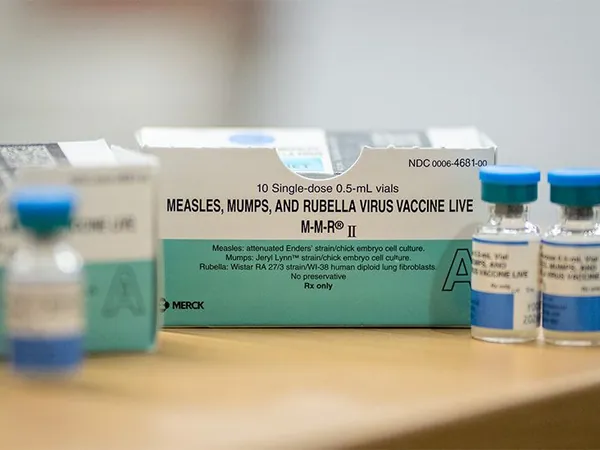
Measles: Uncovering the Hidden Long-Term Risks – What You Need to Know!
2025-03-27
Author: Daniel
Introduction
Measles may seem like just another contagious viral disease that fades away quickly, but recent studies reveal it can lead to long-term health issues that are far from trivial. As an outbreak in Texas and New Mexico spreads, infecting 378 people across 18 states, parents and health experts alike are raising alarms about the potentially devastating consequences of this disease.
Acute Symptoms and Long-Term Effects
While measles typically presents acute symptoms that take about 7 to 18 days to manifest, the far-reaching effects of the infection can linger long after recovery. Medical experts have shed light on alarming complications that arise post-infection, which include severe neurological and respiratory issues, as well as disturbances to the immune system.
Immune Amnesia and Increased Susceptibility
Experts, including infectious disease specialist Dr. Monica Gandhi and family medicine physician Dr. David Cutler, emphasize the phenomenon of "immune amnesia." This condition leaves the immune system vulnerable by effectively erasing its memory of how to fight off previously encountered infections. The implications are significant: Individuals can suffer from increased susceptibility to various illnesses for up to 2-3 years following a measles infection.
Dr. Cutler elaborates on this concept: “[The measles virus] replaces the old memory cells of its host with new, measle virus-specific immune cells. Consequently, patients emerge with heightened vulnerability to other pathogens, which can lead to serious infections like pneumonia.” Dr. Gandhi echoes this concern, stressing that such vulnerabilities may increase the risk of mortality from other infections during this critical period.
Historical Context and Severe Outcomes
Historically, before widespread vaccination efforts began, measles was responsible for millions of childhood deaths annually according to the World Health Organization (WHO). One particularly severe long-term consequence of measles is Subacute Sclerosing Panencephalitis (SSPE), a rare but devastating neurological disorder that can develop 7-10 years post-infection. Symptoms include behavioral changes, cognitive decline, and seizures, typically culminating in a comatose state and even death.
Additionally, other neurological complications can arise, such as acute disseminated encephalomyelitis (ADEM), transverse myelitis, and Guillain-Barré syndrome. Victims often face lasting cognitive impairments that impact their quality of life.
Measles During Pregnancy
Pregnancy further complicates matters, as a measles infection during this period heightens the risk of miscarriage, premature birth, and congenital defects. Pregnant individuals may also face severe complications such as pneumonia and encephalitis due to the combined immunosuppression from both pregnancy and the viral infection.
Respiratory Health Risks
The far-reaching implications of measles also extend to respiratory health, where conditions like bronchiectasis and interstitial pneumonitis may develop, and even the reactivation of latent tuberculosis has been reported. This underscores the critical importance of vaccination to prevent the spread of measles and ensure community immunity.
Conclusion
As the current outbreak continues to affect many across the United States, the message is clear: staying fully vaccinated against measles is not just a protective measure for individuals—it safeguards the health of entire communities and minimizes the risk of significant long-term health consequences.
In a world still grappling with vaccine hesitancy, understanding the severe risks associated with measles is vital to ensuring no one is left vulnerable. If you or your loved ones have yet to receive a measles vaccination, now is the time to act! Let’s protect our future and prevent another outbreak!




 Brasil (PT)
Brasil (PT)
 Canada (EN)
Canada (EN)
 Chile (ES)
Chile (ES)
 Česko (CS)
Česko (CS)
 대한민국 (KO)
대한민국 (KO)
 España (ES)
España (ES)
 France (FR)
France (FR)
 Hong Kong (EN)
Hong Kong (EN)
 Italia (IT)
Italia (IT)
 日本 (JA)
日本 (JA)
 Magyarország (HU)
Magyarország (HU)
 Norge (NO)
Norge (NO)
 Polska (PL)
Polska (PL)
 Schweiz (DE)
Schweiz (DE)
 Singapore (EN)
Singapore (EN)
 Sverige (SV)
Sverige (SV)
 Suomi (FI)
Suomi (FI)
 Türkiye (TR)
Türkiye (TR)
 الإمارات العربية المتحدة (AR)
الإمارات العربية المتحدة (AR)